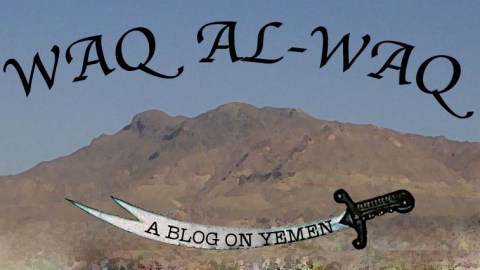Anwar al-Awlaki: A Dissent

Since the death of Anwar al-Awlaki, the debating lines surrounding him have hardened. Some have kept the conversation civil; many have not.
There are, as I see it, two main questions around his death.
1. Was it legal?
2. Was it wise? Or, to put it slightly differently, will his death make Americans safer?
Broadly speaking there are three groups weighing-in on these questions: legal scholars, al-Qaeda watchers, and observers of Yemen.*
My opinion on al-Awlaki is fairly well known, but it is also, it seems, a minority one. Given how many smart people have lined up on the other side of the debate I thought it would be wise to re-examine my thinking and look for things I may have overlooked, which is what I’ve been doing for the past several days.
Now, I’m obviously not a legal scholar, and while the legal aspects are intriguing, I can’t comment on them in any sort of an expert fashion. However, it reads to me, as if the legal scholars are split.
On one side is someone like Bruce Ackerman, who wrote this piece in Foreign Policy – in many ways a response to this piece in Reuters, which I think everyone should read.
On the other side, at least provisionally, are people like Jack Goldsmith and Robert Chesney, both of whom write at, among other places, Lawfare. I would also recommend this probing essay from Daniel Bentham.
However, on the second question – was it wise/does it make America any safer? – I do have opinions that are grounded in years of research and scholarship.
There are, as I mentioned above, basically two groups I’ve been reading on this. The first group is al-Qaeda watchers (I hesitate to call them counterterrorism experts because of the frauds that use the title). This group – and I’m thinking of smart people with years of experience like Thomas Hegghammer, Will McCants and Clint Watts – has largely come down in the affirmative.
Yes, killing Anwar al-Awlaki was necessary, wise, and will likely go a long way towards making the US safer.
Probably the most articulate and comprehensive proponent of this view has been Thomas Hegghammer, who wrote this piece in Foreign Policy countering my NYT op-ed.
Thomas and I went back-and-forth a bit in private and also here at Waq al-waq. But his basic point remains that A.) Anwar al-Awlaki is AQAP’s Head of Foreign Operations and B.) if protecting the homeland is a priority, then dismantling AQAP’s Foreign Operations Unit should be at the top of America’s counterterrorism agenda in Yemen.
And it seems that it was. The Obama administration called Awlaki, as Thomas did, the “head of the Foreign Operations Unit.”
Interestingly Thomas makes the argument that the US should seek to arrest Awlaki, which apparently the US came to the conclusion was not feasible.
The third group has been Yemen watchers, and here – although I may have missed some (its a pretty small group of people with both language and experience in the country) – most seem to come down on the other side, arguing that the strike on Awlaki was neither wise nor would it likely make the US any safer.
Now each of these two groups bring their own biases to bear on the question, which is why I have taken so long (re)thinking through the question.
First, as I argued in my op-ed, Awlaki was a threat and someone who called for the death of Americans, but I thought then and I still believe now that he was not the most dangerous individual within AQAP when it comes to US national security. There are men who are still alive and at-large in Yemen, who represent, in my view, a much greater threat to US national security.
Does this mean the US should not have killed him? I don’t know, but I do know that I worried that the US would think it could protect itself from an attack out of Yemen by a few well-placed drone strikes.
And now we have this from the Washington Post:
“U.S. officials, in turn, express little interest in the insurgency in Yemen and say their counterterrorism efforts are limited to what they describe as a minority within al-Qaeda’s Yemeni affiliate that is focused on U.S. attacks.“
as well as:
“The United States will not become involved in the latter in Yemen, where there “is a veritable stew of counterinsurgencies, different political elements and competing factions,” the official said, adding that the United States would fight AQAP only to prevent it from attacking the United States and its interests.“
and this:
“AQAP leaders focused on attacking the United States and its allies number only “a couple of dozen, maybe,” White House counterterrorism adviser John O. Brennan said last month.”
As I re-examined both my thinking as well as the open-source evidence, several things struck me. One was the chronology.
Shortly after AQAP’s attempt to bring down the airliner on Christmas Day 2009, I remembered Brennan saying the US had made a mistake in underestimating, basically believing the group was limited to the Arabian Peninsula and not a threat cable of projecting power across the Atlantic.
Brennan, of course, was the individual responsible for the subsequent intelligence review that took place.
One of the key questions of the review was: how had the US missed this threat? In looking back, I wonder if in searching for the missing piece of the puzzle if US intelligence analysts seized on the one of Anwar al-Awlaki.
He was the missing piece. The US knew AQAP had the “aspiration” to hit at the US, but it didn’t believe it had the talent. Well, from the point of view of harried intelligence analysts, Awlaki was that talent. He had years of experience in the west, which the September 11 attacks had taught was necessary for a strike on the US.
Basically, you can look at the Christmas Day plot in 2009 one of two ways. Either it is a dramatic new turn for an organization, or it is the natural evolution of a growing organization.
If you take the former view, then it is easy to use Anwar al-Awlaki to explain why AQAP could suddenly target the US when it had never done so previously. But if you took the later view than it was less Awlaki’s existence than the group’s growing strength that was important.
Here too, I think US analysts were at a disadvantage, in the years 2006 – 2008 few in the US government were focused on the AQ threat in Yemen. It was only after the attack on the embassy in Sanaa in September 2008 that the US re-awoke to the threat. Given that short view – the one that looks at AQAP as a new organization, instead of an older, evolving one – I think also led analysts to seize on Awlaki as the key reason for AQAP’s focus on the US.
I thought then, and I continue to think that this was a mistake. Little in the west is known about Nasir al-Wihayshi – the leader of AQAP – and that is the shame, but this is the guy that is coming after the US. Wihayshi, as interviews with fighters from Afghanistan lay out, was bin Laden’s personal secretary for nearly four years. According to these interviews, Wihayshi was rarely apart from bin Laden.
Do we really think that an apprentice, really an understudy, who would one day go on to build an al-Qaeda affiliate based on the blueprints bin Laden used in Afghanistan really needed Anwar al-Awlaki to attack the US?
Not that Awlaki didn’t play a role but that he was dispensable?
There are a number of other things that just don’t seem, at least to me to add up. The US claims that it targeted Awlaki as the head of the Foreign Operations Unit, but at the time the legal justification was being written (circa June 2010) the issue of Inspire with the article that may or may not have been written by Awlaki had yet to be published.
There are also the now admissions by officials in the US government that some of the evidence for Awlaki’s operational role was “patchy,” at least according to this Reuters report.
There is also this:
“Awlaki was also implicated in a case in which a British Airways employee was imprisoned for plotting to blow up a U.S.-bound plane. E-mails retrieved by authorities from the employee’s computer showed what an investigator described as ” operational contact” between Britain and Yemen.
Authorities believe the contacts were mainly between the U.K.-based suspect and his brother. But there was a strong suspicion Awlaki was at the brother’s side when the messages were dispatched.”
I’m not really sure how the US judged that Awlaki was standing next to someone who was typing.
There is still, in my opinion, much more that we don’t know about Anwar al-Awlaki and his role in AQAP than what we know.
After my ten-day personal review, I’m still convinced that the US got AQAP wrong. It saw it as a group that was moving one way and then veered in a completely different direction. This understanding of AQAP, I believe, led analysts to fixate on Awlaki. And he was a threat, but not nearly the most significant threat to US national security out of Yemen.
*There are, of course, many more groups talking about Anwar al-Awlaki – everyone has an opinion – but these are the three groups I’m reading and listening to.





